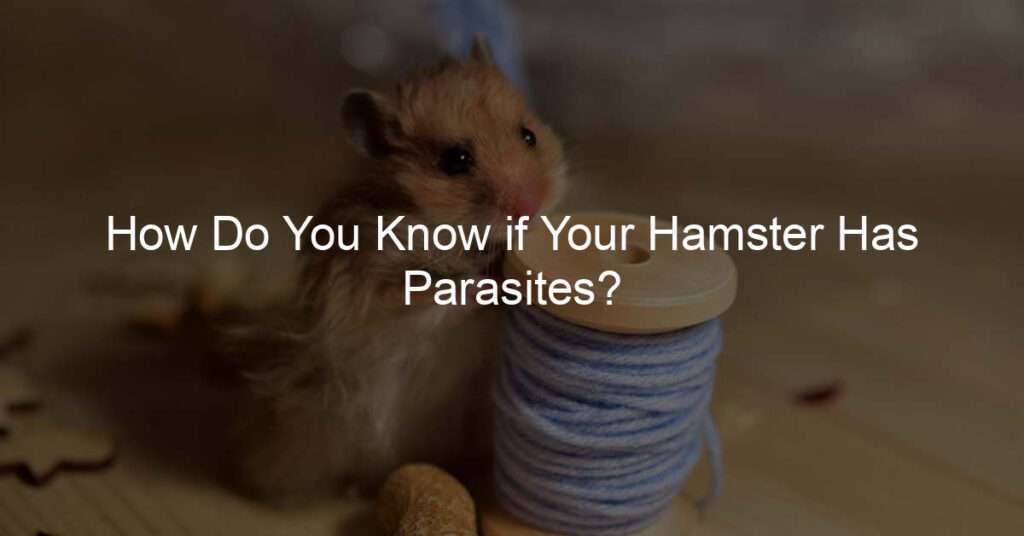If you own a hamster, it’s important to know how to tell if your furry friend has parasites. While Parasites are more common in wild hamsters, domestic hamsters can also get them.
Here are some signs to look for that might indicate your hamster has parasites: loss of appetite, Weight loss, lethargy, and diarrhea. If you notice any of these symptoms in your hamster, take them to the vet right away so they can get the treatment they need.
Can you get parasites from your hamster?
According to the Centers for Disease Control, it is possible to get parasites from your pet hamster.
These parasites, called zoonotic parasites, can be spread through contact with an animal’s fur, saliva, or feces. Symptoms of a parasite infection caused by a hamster can range from mild inflammation to severe fever and abdominal pain.
It is essential to take precautions when dealing with a pet hamster, such as washing hands immediately after contact and avoiding contact with their fur or waste products.
Taking these measures will help prevent individuals from contracting parasites from their pet hamsters and keep everyone safe and healthy.
What do you do if your hamster has parasites?
If your hamster has parasites, it is important to take quick action to ensure the health of your pet. The first step is to have the hamster examined by a vet. They can confirm whether or not there are parasites present, and what type of parasites they are.
This will allow your vet to suggest an appropriate treatment plan so that your furry friend can live a healthy and happy life.
Parasites can be uncomfortable for your pet hamster and lead to serious health issues if left untreated for too long, so prompt vet visits are essential if you suspect your hamster may have been infected.
What causes parasites in hamsters?
Hamsters are beloved little pets, but unfortunately, they can get parasites. Often, these parasites are contracted from poor living conditions, in particular, due to poor hygiene and lack of regular cleanings.
Several parasites can derive from contaminated food or water that has been exposed to fecal matter or urine. These include pinworms, roundworms, and coccidia.
Overcrowding can also be a factor as well which results in compromised fur coats and weakened immune systems leading to an increased risk for parasites.
Diet plays a role too with poor quality diets lacking essential vitamins and minerals leaving the hamster’s body more vulnerable to infections from worms.
To help prevent any parasitic infections hamsters should always have fresh food and water, a clean living environment with regular bedding changes, and plenty of space to roam around in their enclosure.
How do I prevent my hamster from getting parasites?
Keeping your hamster healthy and free of parasites is a fairly straightforward process. Regularly inspect your pet’s fur and skin, since an infestation can be easily identified by the presence of bugs or changes in the color, texture, or thickness of its coat.
Additionally, make sure to regularly clean its cage using warm water mixed with mild soap then rinse it with white vinegar to make it inhospitable for parasites.
And lastly, feed your pet nutritious foods that are designed specifically for hamsters; a healthy diet will help keep it strong and less susceptible to everything from common colds to parasite infestations.
With these simple steps, you can help ensure your furry family member stays safe and sound for years to come!
What kills parasites in animals?
Parasites in animals can be very difficult to eradicate, but there are a variety of treatments that can be used. Different types of parasites responded differently to treatments, so it is important to identify the parasite before attempting any course of action.
Some parasites can be killed through deworming medications and antibiotics, while other parasites may require more aggressive approaches such as antiparasitics or antifungals.
Additionally, changing the environment or diet of an infected animal can sometimes help reduce the presence of parasites. In some cases, surgical removal may be necessary to completely rid an animal of its parasite infestation.
All in all, careful observation and correct diagnosis are crucial to determine which treatment approach is right for removing a given parasite from an animal’s body.
How do you keep parasites away?
Keeping parasites away from your health is an important element of protecting yourself. One way to do this is with regular preventative care for pets, as parasites are more inclined to make themselves at home in sick animals.
Overall health and hygiene are key when it comes to avoiding these little critters. Proper hand-washing techniques should be followed, especially before eating and after handling thought-to-be contaminated surfaces.
Food should be well cooked, stored correctly, and consumed while fresh to avoid any bug that may have decided to take a quick bite.
If traveling abroad or camping in warm, damp climates, extra attention should be paid; always treat or boil any water taken from rivers or streams before drinking!
With the right preventative measures, people can rid their lives of troublesome pests and keep away from external parasites.
The Bottom Line
To conclude, being aware of the potential parasites and common infection symptoms in hamsters can help you to prevent, detect and take prompt action for any health issues your hamster may experience.
Even if it doesn’t seem like there is much you can do as a pet owner to actively prevent parasite outbreaks in your hamster’s home actively, making sure you keep their living space clean and handle them with clean hands can significantly improve their quality of life.
Additionally, regular vet check-ups should always be made part of your hamster care routine; although many infections don’t cause apparent harm in the short term, they can get worse over time and even result in fatality if left untreated.
Therefore it is essential to keep an open dialogue with your vet regarding any changes or concerns that you have about your hamster’s health.
Finally, although it may be difficult to accept sometimes, trusting routine medical advice from trained experts will benefit both you and your pet long-term.








